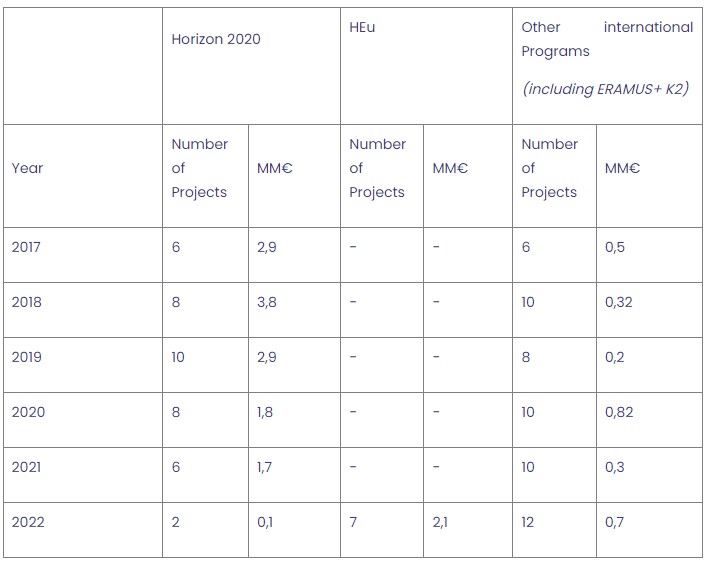Universidad Rey Juan Carlos (URJC) URJC is a young public university with several campuses in the greater Madrid area, whose mission is to foster innovative research and high-quality education in one of Spain’s fastest-growing regions. URJC has managed to grow up to almost 45,000 students and nearly 2,600 lecturers, being currently the second largest among the six public Universities in Madrid in terms of students. URJC has a strong international projection, with an academic community comprising 3,300 foreigners from 60 countries.
European Projects Office (EPO)
URJC has established a European Projects Office (EPO) to strengthen participation in international research activities. EPO collaborates in two main ways: on the one hand, attending and handling both administrative and financial issues from the different projects and actions, and on the other hand assisting the researchers and the projects/actions individually by providing support in different tasks regarding Technology Transfer, IP management and support, Open Access, Technology Watch and so on. The EPO has a staff with a technical and financial background, and skills to develop the above-described activities. Additionally, the EPO has a delegation in the Office of the Madrid Region in Brussels whose primary mission is to serve as a liaison and interface, between researchers and European institutions.
Since 2017, URJC has been involved in more than 93 European (74 that included 27 Erasmus+ projects) and International projects (19 projects) with a total of EU funding up to about € 15 MM, of which 40 belong to the H2020 Programme and 7 to the Horizon Europe Programme. URJC has actively participated in the Marie Sklodoswska Curie Actions, acting as a hosting institution for researchers, and participating in Individual Fellowships actions.
The following table reflects the number of research projects and the amount financed by the European Commission and other international entities over the last seven years.

Mission:
Rey Juan Carlos University performs the public service of higher education through research, teaching and study. The functions of the Rey Juan Carlos University at the service of society are:
The creation, development, transmission and criticism of science, technology and culture.
The preparation for the exercise of professional activities that require the application of knowledge and scientific methods and for artistic creation.
The diffusion, valorization, and transfer of knowledge at the service of culture, quality of life, and economic development.
The dissemination of knowledge and culture through university extension and lifelong learning
Key Research Areas
As a multidisciplinary academic and research entity, Universidad Rey Juan Carlos promotes research aimed at economic and social development, promoting and enhancing the research activity, dissemination and transfer of knowledge and research results to society.
The promotion of R&D&i activities are carried out through collaborations with companies and institutions, and participation in national and international calls that allow our researchers to develop their research lines contributing to the generation, expansion and dissemination of knowledge, and the advancement of science and technology.
The main research areas in URJC are:
Science and Engineering
Renewable and clean energies
Environment, resources and sustainability
Green Technologies
Valorization of wastes
Climatology and climate change
Biochemistry
Design of materials with innovative properties
Computing Engineering and ICT
Simulation engineering and modelling
Software engineering
Open Source Software
Software Design & Development
Computer animation
Cyber Security
Cloud computing
E-learning
Numerical analysis (simulation, optimization, modelling tools)
Health
Biomechanics
Physiotherapy
Medicine and Surgery
Psychology
Medical Microbiology
Immunology
Social Sciences
Protection of citizens (goods and people)
Labour economics
Countering violent extremism
Criminal justice
Social structure (inequalities, social mobility, interethnic relations).
Legal History and Humanistic sciences
Communication Sciences
Team:
Carmen De-Pablos-Heredero
